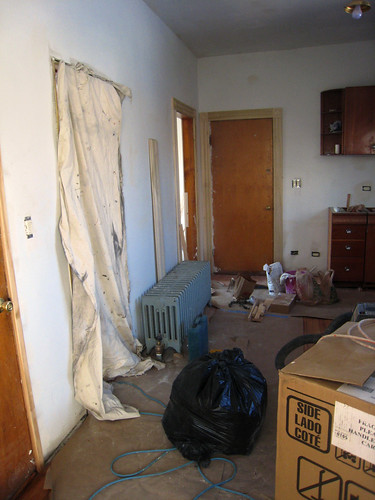A complaint that I often hear from some of my fellow foreigners living in Japan is about their living arrangements. When it comes to trying to find a new place to live they tend to hit a little snag.
“Oh my god! They won’t rent me the apartment I want JUST because I’m a foreigner! That’s so racist it makes me sick! They didn’t say it in those words, but I know what they god-damn meant!“
It’s usually at this point I try to calmly walk away from said person and conversation, maybe head to a cafe for a cup of tea and reflect on what I just heard. Alas the “just because I’m a foreigner” and “they’re all racist” argument has shown itself again. While I’m not going to get into that right now, today I’ll give some advice on what might really be going on and how you can find yourself a nice little place to live with as little fuss as possible. And for the record I’m only going to be talking about apartment rentals in this blog. I’ve never bought property so I won’t talk about that, and though I was renting a house back in Yamaguchi, I didn’t have to find it myself or anything; it was all pre-arranged. I’m also going to point out that I’m no expert here, having only rented two properties in Japan and two back in the UK.
Let’s talk about possible reasons why a letting agent, or the owner of the apartment, might not want to rent to someone. While this list is not exhaustive, since people can have many different reasons, it’s important to keep an open mind about why you can’t get a specific apartment.
Bad experiences in the past
Imagine you own a small store and sales are going well. Then one day a guy in a giant pink cowboy hat comes in and buys a few things. But on leaving the store he urinates over the front door. The next day a completely different guy comes in with the same giant pink cowboy hat, buys a few things and urinates on the door. This carries on daily, and eventually you decide not to allow people with giant pink cowboy hats in the store. If you have bad experiences with something, then you’ll take steps to try and prevent it in the future. Have you ever been to a restaurant with bad service and decided not to go back?
This is not only the case with foreign tenants, but people of varying professions also. Many landlords in the UK won’t let to students because of past experiences with damaged wall or such. Personally speaking, based on some of my past experiences I’d be very wary about letting to certain people, particularly if I was worried that they will leave the apartment in a state of disrepair.

Potential renter is unemployed or the apartment is too expensive for them
If you’re currently out of employment without another job lined up then it will be hard to get an apartment. Even if you have a nest-egg saved, landlords will be worried about future rent payments. With unemployment there is also a fear that the tenant will just abandon the property without properly winding up. Sadly there have been many foreigners who have just left Japan without paying rents, bills and other debts. I used to work with a guy who tried to abandon a very damaged apartment after running up extremely high bills.
Choosing a a suitable rent amount is also important. If you’re earning 200,000 yen a month (before deductions) and you want to rent an apartment that is 100,000 yen a month, that’s half well over half of your take-home pay gone on just your rent. Once you take living expenses and bills into account, you’re going to be in trouble. As such some letting agents set rules on maximum rents as a percentage of your income. For my apartment back in Funabashi the limit was 25%.

Communication Issues
How’s your level of Japanese? Can you speak the local language? Could you read a housing contract? Yes, you could take a friend with you when you look at apartments and sign the paperwork to make sure that you understand everything. But what happens if they need to contact you in an emergency? It’ll be a huge inconvenience (as well as potentially dangerous) for a landlord to have to wait to go through a friend every single time there is an issue. Not to mention how much of a pain in the butt it’ll be for your friend. I hope you’re going to pay them to be on call for you.
How will you be able to communicate with your neighbours? You can’t assume that everyone will be able to, let alone want to speak in English to you. Though to be fair I don’t talk with my neighbours very often, if at all. The landlord will also be considering the neighbours when deciding who to let to, as any conflict will cause problems for them too. That’s not to say they will always assume you will cause troubles, but if your potential neighbours are unlikely to get on with you (for a variety of potential reasons) they’d surely rather avoid a bad situation before it begins.

Wrong number of tenants
In my searches for an apartment I have only had to find a single resident property. Some properties on the market are available exclusively for families, others for couples, some for sole-residents. The most common variation that I have seen however, are for maximum occupancy. Be aware that the apartment you want might require a different occupancy than you can offer.
There are also certain apartments that require a specific relationship status between occupants if it is for a multi-occupancy. As I mentioned earlier sometimes apartments are family only, but some may also allow groups of friends. UR Homes, an organisation I will talk about below, only allows family members up to a certain distance to live with you, so no 2nd cousins once removed or such.

Personal prejudices
And of course there will be people who hold their own personal prejudices, and this has the potential to get between you and the apartment you want. But let’s be honest, no one is so high and mighty that they don’t have their own prejudices against certain types of people, even if they don’t act upon them.
But this isn’t a Japan only thing. When you think of your own country, can’t you think of a group of people who might have trouble renting an apartment in certain areas? And no I’m not just talking about ethnicity, religion, sexuality and so on.
Putting aside the fact that you might feel personally insulted by not being able to rent this one apartment, why would you want to live in an apartment where the landlord doesn’t want you? Personally I try not to go where I’m not welcome. This is also why you should try and find a few apartments, shop around! Don’t put all your eggs in one basket, as the saying goes.

Right, so we’ve talked about reasons why you might not be able to get the apartment you want, but there are so many empty apartments out there. Let’s talk about the different ways you can go about finding somewhere new to live in Japan.
UR Homes
I wanted to put UR Homes first because unlike the letting agents that will follow, this is public sector housing. UR (Urban Renaissance) homes do not need a guarantor, does not require key-money, a renewal fee, and in most cases have a rolling contract. This is great if you might not be staying for too long, or want to give shorter notice when you are leaving. If memory serves, I think just two weeks notice is needed.
UR Housing is generally large scale apartment complexes known as “Danchi“, and will vary in quality depending on the age of the site. My apartment in Funabashi was a UR Home and I was very happy with the condition of the site and atmosphere of the complex. In fact when it came to moving for my current job the first thing I did was look for other danchis. As I came to discover though many danchis do look the same (especially externally) they do vary in cost and quality throughout the board.
Danchi apartments are available on a first-come first-serve basis, with a lottery type system used if multiple applications are received at the same time. Though there are UR Home letting agents available throughout Japan, UR Whitestone appears to be the only one with a specialist English service. This is the group I used for my Funabashi apartment do highly recommend their services. Just to point out, you don’t pay an agency fee or anything to them. They receive a commission from the UR Agency, kind of like a one-way finders fee.

Specialist English speaking letting services
If you type into google something along the lines of “apartment in Japan” you’ll see some adds for English speaking companies at the top that specialise in just that. You’ll also probably see GaijinPot and Real Estate.co.jp. These websites can really help you to see what is out there and easily available to foreign residents. Letting agents and landlords using these sites know that they are dealing with an international customer base so they have already taken that into account. Please read the descriptions carefully though, and be sure to ask lots of questions to be sure that you are a good match for potential apartments (though that should go without saying).
Websites like this have the potential to be a little more expensive than their Japanese counterparts which at first glance might seem unfair, but they did have to put that extra man-power (and in some cases take on specialist staff) to be able to offer this service. Let’s try to understand why things might be the way they are rather than go flying off the handles, ok?

Going Local
If you can use Japanese by yourself, using regular Japanese house hunting methods might be the way to go. There are plenty of smart phone applications based off of their website equivalents to help this search. For my current apartment I downloaded and used the following apps with various degrees of success:
Suumo, At Home, Home’s, Ii Heya, Chintai, Leo Palace 21, Century 21
All of these apps have their good and bad parts, depending on what you’re looking for. I was personally happy whenever I saw a search by map function. I can’t tell you which was the best app though, as I last opened them over 6 months ago when I was looking for my current apartment. I really should delete them from my phone.

When you find a few apartments that you like, you fill in your details and hit the enquire button. This will send your information to the relevant letting agents and they will then get back to you. It is crucial here that you are as open about your needs as you can be, and also as honest about yourself as you can. This will help you later on to develop a good relationship with the letting agents. In the comments field I was always sure to write in Japanese that I “was from the UK, had a working visa, currently living in Funabashi, moving to start a new job, require a guarantor company as I do not wish to burden my friends, and that I was looking forward to hearing about other similar properties if for whatever reason the one I was asking about was unavailable“. By doing this you are actually helping the letting agent so that they can be fully prepared when they contact you.
By only giving your name, it puts them in the sticky situation where they’re unsure if they should communicate with you in Japanese or try to use an on-line translation tool and panic when things go wrong. This isn’t a great way to start. Some of the apps do have English options, but not all of the letting agents who use them can use English.
I arranged viewings with a few of the letting agents through these apps. By having a back and forth with them via email, you start to develop a good relationship and build a good rapport. When I went to their offices they did ask some more questions about my needs and showed me files for other properties. For ones I was interested they called the owners to see if my circumstances were all right. One owner seemed to be very frank about not wanting another foreign tenant, to which I said to the letting agent that I completely understood that he may have had bad experiences in the past and that we could just find another place. The letting agent seemed to take this response very positively and even though in the next call the owner was very hesitant about it, the letting agent actively persuaded them to let me view the apartment.

By building a good relationship with the letting agents, they will show you properties that are not normally available but they will try to get for you. I listened in to the call that was taking place at the table next to me and the letting agent definitely did not seem to be as persuasive. That being said the customer had been quite brusque throughout.
I’m going to give a special mention to two letting agents who really did go above and beyond for me. I value customer service VERY highly, and cannot praise House Partner Shin Matsudo and House Navi Matsudo high enough. They were fantastic and I highly recommend them.
Remember that when it comes to house hunting, it’s a hand-in-hand affair. You have to show to the owner that you are the type of person they should be letting their property to, not just them trying to make a good impression. Though letting agents will be doing background checks on you, at any stage up until you sign the contract the owner can say no. Sometimes to soften the blow the background check might “have something the owner didn’t agree with” and if that happens, just accept it and move on. If you’ve got a good thing going with the letting agent, they’ll have another couple of properties lined up ready for you. Though it may seem unfair, people will always base their decisions on their experiences. Let’s react positively and find an awesome place to live.

